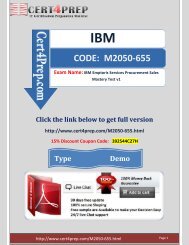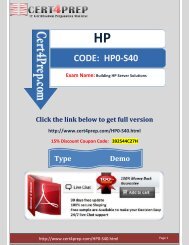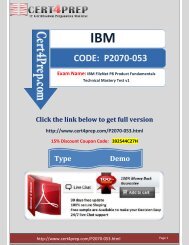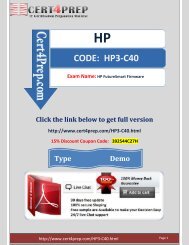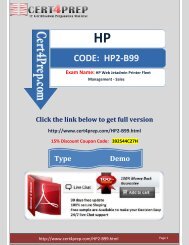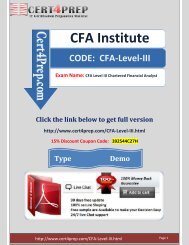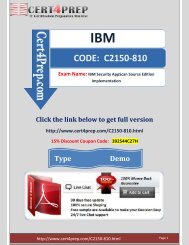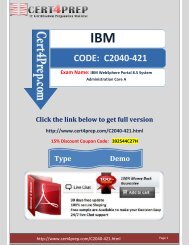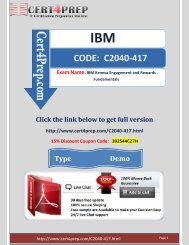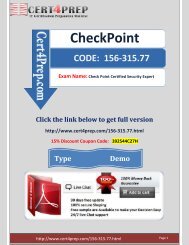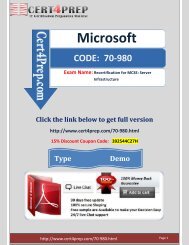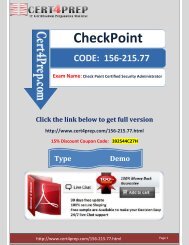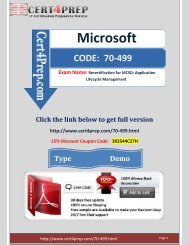1Z0-460 Free Demo Questions and Answers PDF.pdf
Cert4Prep is your ultimate source for exam questions and answers pdf type pdf questions and answers.
Cert4Prep is your ultimate source for exam questions and answers pdf type pdf questions and answers.
You also want an ePaper? Increase the reach of your titles
YUMPU automatically turns print PDFs into web optimized ePapers that Google loves.
Oracle<br />
CODE: <strong>1Z0</strong>-<strong>460</strong><br />
Exam Name: Oracle Linux 6 Implementation Essentials<br />
Click the link below to get full version<br />
http://www.cert4prep.com/<strong>1Z0</strong>-<strong>460</strong>.html<br />
15% Discount Coupon Code: 392544C27H<br />
Type<br />
<strong>Demo</strong><br />
http://www.cert4prep.com/<strong>1Z0</strong>-<strong>460</strong>.html Page 1
Question: 1<br />
Finding a directive issued by your organization listing several important CVEs (Common Vulnerability <strong>and</strong><br />
Exposures), you find one for Linux OpenSSH (CVE-2006-5764), which might apply to your oracle Linux<br />
systems. What comm<strong>and</strong> would help ensure that a patch has been applied to close this vulnerability on<br />
an Oracle Linux 6 system running OpenSSH server?<br />
A. yum listcves openssh<br />
B. rpm –qa | grep openssh | grep 5794<br />
C. rpm –q - - changelog openssh | grep 5794<br />
D. yum sec – list cves | grep 5794<br />
E. yum sec – list cvesApplied<br />
Answer: C<br />
Explanation:<br />
* The comm<strong>and</strong> rpm -q --changelog rpm displays a detailed list of information (updates, configuration,<br />
modifications, etc.) about a specific package. This example shows information about the package rpm.<br />
However, only the last five change entries in the RPM database are listed. All entries (dating back the last two<br />
years) are included in the package itself. This query only works if CD 1 is mounted at /media/cdrom:<br />
rpm -qp --changelog /media/cdrom/suse/i586/rpm-3*.rpm<br />
* Is the patch RPM suitable for my system?<br />
To check this, first query the installed version of the package. For pine, this can be done with<br />
rpm -q pine<br />
pine-4.44-188<br />
Question: 2<br />
Which three parameters of a network interface can you modify by using the NetworkManager tool on<br />
your Oracle Linux 6 system?<br />
A. IPv4 settings<br />
B. IPv6 settings<br />
C. Netconsole settings<br />
D. MTU settings<br />
E. IP Proxy settings<br />
Answer: A, B,D<br />
Explanation:<br />
http://www.cert4prep.com/<strong>1Z0</strong>-<strong>460</strong>.html Page 2
Note:<br />
1 Right-click the NetworkManager icon in the notification area at the top-right corner of the Red Hat<br />
desktop <strong>and</strong> click "Edit Connections."<br />
2<br />
Click the "System eth0" connection on the wired tab <strong>and</strong> click "Edit."<br />
3<br />
Click the "IPv4 Settings" tab.<br />
Question: 3<br />
Which two statements describe the capabilities used with the Unbreakable Enterprise Kernel?<br />
A. Existing Red Hat Enterprise Linux 5 <strong>and</strong> 6 customers need to reinstall Oracle Linux to use the<br />
Unbreakable Enterprise Kernel.<br />
B. The Unbreakable Enterprise kernel is the default kernel starting with Oracle Linux 5.6.<br />
C. The Unbreakable Enterprise kernel is required when using multithreaded CPUs.<br />
D. Oracle Clusterware, OCFS2, <strong>and</strong> the Enterprise Manager pack for Linux support are included with<br />
Oracle Linux Basic <strong>and</strong> Premier support.<br />
E. Switching between the Red Hat Compatible kernel <strong>and</strong> the Unbreakable Enterprise kernel is simple<br />
http://www.cert4prep.com/<strong>1Z0</strong>-<strong>460</strong>.html Page 3
process of changing kernels <strong>and</strong> glibc.<br />
Answer: D, E<br />
Explanation:<br />
* Commercial technical support is available through Oracle's Oracle Linux Support program, which<br />
supports Oracle Linux, <strong>and</strong> existing RHEL or CentOS installations (i.e. without reinstallation).<br />
Note:<br />
* The Unbreakable Enterprise Kernel Release 2 is Oracle's second major release of its heavily tested <strong>and</strong><br />
optimized operating system kernel for Oracle Linux 5 <strong>and</strong> Oracle Linux 6.<br />
Unbreakable Enterprise Kernel Release 2 is based on the mainline Linux kernel version 3.0.16 <strong>and</strong> boasts<br />
a wide range of new features <strong>and</strong> improvements relevant for enterprise workloads.<br />
Incorrect:<br />
Not A, not B: Unbreakable Enterprise Kernel Release 2 can be installed on Oracle Linux 5 Update 8 or<br />
newer, as well as on Oracle Linux 6 Update 2 or newer.<br />
Question: 4<br />
View the exhibits.<br />
http://www.cert4prep.com/<strong>1Z0</strong>-<strong>460</strong>.html Page 4
Examine the output of sar comm<strong>and</strong> <strong>and</strong> the top comm<strong>and</strong> in the Exhibits. Which statement is the<br />
correct interpretation of this data?<br />
A. The system is running low on swap space <strong>and</strong> memory.<br />
B. CPU is Idle <strong>and</strong> the system has plenty of free memory available.<br />
C. The CPU utilization is high <strong>and</strong> one process is using most of the CPU.<br />
D. The system is idle with very little memory, CPU, <strong>and</strong> I/O utilization.<br />
Answer: C<br />
Explanation:<br />
From the top exhibit we see that npviewer.gin uses 73.4% of the available CPU.<br />
Note:<br />
* sar - Collect, report, or save system activity information.<br />
* The sar comm<strong>and</strong> writes to st<strong>and</strong>ard output the contents of selected cumulative activity counters in<br />
the operating system. The accounting system, based on the values in the count <strong>and</strong> interval parameters,<br />
writes information the specified number of times spaced at the specified intervals in seconds.<br />
* sar –u 2 5<br />
Report CPU utilization for each 2 seconds. 5 lines are displayed.<br />
Question: 5<br />
Which three steps are involved in the installing Ksplice on servers that will be updated?<br />
A. You have to be logged as user “ksplice” on the server you want to prepare <strong>and</strong> install Oracle Ksplice<br />
on.<br />
B. The Uptrack package needs access directly or through a proxy to the Oracle public yum repository<br />
(http://public-yum.oracle.com/) to download the required packages for the uptrack-* utilities to be able<br />
to work correctly.<br />
C. Download the install-uptrack script using the “wget –N http://www.ksplice.com/uptrack/installuptrack”<br />
comm<strong>and</strong>.<br />
D. You have to be logged in as user “root” on the server you want to prepare <strong>and</strong> install Oracle ksplice<br />
on.<br />
E. The uptrack package will set up a yum repository (/etc/yum.repos.d/ksplice-uptrack.repo) <strong>and</strong><br />
download the required package for the uptrack-* utilities to be able to work correctly.<br />
F. Download the ksplice ISO image from https://edelivery.oracle.com/linux <strong>and</strong> then run the “sh installuptrack”<br />
script from the ISO image.<br />
Answer: BCD<br />
Explanation:<br />
B: Your system must have access to the internet to install Ksplice. If you are using a proxy, set the proxy<br />
in your shell:<br />
http://www.cert4prep.com/<strong>1Z0</strong>-<strong>460</strong>.html Page 5
export http_proxy=http://proxy.company.com:port<br />
export https_proxy=http://proxy.company.com:port<br />
CD: Once you have an access key run the following comm<strong>and</strong>s as root, replacing YOUR_ACCESS_KEY<br />
with the access key you received upon sign-up:<br />
wget -N https://www.ksplice.com/uptrack/install-uptrack<br />
sh install-uptrack YOUR_ACCESS_KEY<br />
uptrack-upgrade –y<br />
E: If you'd like Ksplice Uptrack to automatically install updates as they become available, run:<br />
sh install-uptrack YOUR_ACCESS_KEY --autoinstall<br />
in place of the above install-uptrack comm<strong>and</strong>, or set "autoinstall = yes" in your<br />
/etc/uptrack/uptrack.conf after installation.<br />
Reference: Ksplice, Installation instructions<br />
Question: 6<br />
What happens when the following comm<strong>and</strong> is run?<br />
# authconfig - - passalgo = md5 - - update<br />
A. It produces the MD5 checksum of the input data.<br />
B. It configures the MD5 checksum for newly authored documents<br />
C. It converts the stdio input to MD5 algorithm.<br />
D. It changes the user password hashing algorithm to MD5.<br />
Answer: D<br />
Explanation:<br />
To configure the Linux system to use the MD5 algorithm, enter:<br />
# authconfig --passalgo=MD5 --update<br />
Note: The default algorithm for storing password hashes in /etc/shadow is MD5. I was told to use SHA-<br />
512 hashing algorithm. How do I set password hashing using the SHA-256 <strong>and</strong> SHA-512 under CentOS or<br />
Redhat Enterprise Linux 5.4?<br />
You need to use authconfig comm<strong>and</strong> to setup SHA-256/512 hashing. This comm<strong>and</strong> provides a simple<br />
method of configuring /etc/sysconfig/network to h<strong>and</strong>le NIS, as well as /etc/passwd <strong>and</strong> /etc/shadow,<br />
the files used for shadow password support. Basic LDAP, Kerberos 5, <strong>and</strong> SMB (authentication) client<br />
configuration is also provided.<br />
Display Current Hashing Algorithm<br />
Type the following comm<strong>and</strong>:<br />
# authconfig --test | grep hashing<br />
Sample outputs:<br />
password hashing algorithm is md5<br />
Configure Linux Server To Use The SHA-512<br />
To configure the Linux system to use the SHA-512 algorithm, enter:<br />
# authconfig --passalgo=sha512 --update<br />
http://www.cert4prep.com/<strong>1Z0</strong>-<strong>460</strong>.html Page 6
Question: 7<br />
As user bob, you have logged in to the system on a terminal <strong>and</strong> issued the following comm<strong>and</strong> to make<br />
the top comm<strong>and</strong> run in the background.<br />
[bob@host - ] top&<br />
You exit from the terminal <strong>and</strong> log back as bob into the system at the same terminal. How is the<br />
background job affected?<br />
A. The background job gets the foreground as soon as bob logs into the system.<br />
B. The background job is suspended temporarily from the job <strong>and</strong> resumes when user bob logs back in<br />
to the system.<br />
C. The background job starts running in the background again as soon as bob logs into the system.<br />
D. The background job will not be affected.<br />
E. The background job is deleted from the job pool <strong>and</strong> does not get listed using jobs comm<strong>and</strong>.<br />
Question: 8<br />
Answer: E<br />
Which rpm comm<strong>and</strong> can be used to find the package that owns the /etc/rsyslog.conf file?<br />
A. rpm –query /etc/rsyslog.conf<br />
B. rpm –gf /etc/rsyslog.conf<br />
C. rpm –q1 /etc/rsyslog.conf<br />
D. rpm –q /etc/rsyslog.conf<br />
Answer: B<br />
Explanation:<br />
Package Selection Options include:<br />
-f <br />
Query package owning <br />
Note:<br />
rpm -q — What does it do?<br />
One of the nice things about using RPM is that the packages you manage don't end up going into some<br />
kind of black hole. Nothing would be worse than to install, upgrade, <strong>and</strong> erase several different<br />
packages <strong>and</strong> not have a clue as to what's on your system. In fact, RPM's query function can help you get<br />
out of sticky situations like:<br />
* You're poking around your system, <strong>and</strong> you come across a file that you just can't identify. Where did it<br />
come from?<br />
* Your friend sends you a package file, <strong>and</strong> you have no idea what the package does, what it installs, or<br />
where it originally came from.<br />
http://www.cert4prep.com/<strong>1Z0</strong>-<strong>460</strong>.html Page 7
* You know that you installed X<strong>Free</strong>86 a couple months ago, but you don't know what version, <strong>and</strong> you<br />
can't find any documentation on it.<br />
The list could go on, but you get the idea. The rpm -q comm<strong>and</strong> is what you need. If you're the kind of<br />
person that doesn't like to have more options than you know what to do with, rpm -q might look<br />
imposing. But fear not. Once you have a h<strong>and</strong>le on the basic structure of an RPM query, it'll be a piece of<br />
cake.<br />
Question: 9<br />
On your Oracle Linux 6 system, you have to configure the eth0 network interface to 100 MB/sec, half<br />
duplex without trying to autonegotiate. Which comm<strong>and</strong> will help you configure this requirement?<br />
A. # ifconfig eth0 speed 100 autoneg off duplex half<br />
B. # ethtool interface eth0 speed 100 autoneg off duplex half<br />
C. # ifconfig interface eth0 speed 100 autoneg off duplex half<br />
D. # ethtool –s eth0 speed 100 autoneg off duplex half<br />
Answer: D<br />
Explanation:<br />
When I have a device that is acting up, I tend to run: ethtool ethX, check the Supported link modes, the Link<br />
partner advertised link modes <strong>and</strong> the actual speed <strong>and</strong> Duplex. If my Supported link mode is set low (say<br />
10/Half for some reason) but my switch supports 1000baseT/Full then I'll use ethtool -s ethX to change my<br />
ethernet settings to 1000baseT/Full. Just about anything you see from: ethtool ethX, can be changed with<br />
ethtool -S ethX. In this case you would use the following:<br />
ethtool -S eth0 speed 1000 duplex full autoneg on<br />
Question: 10<br />
DTrace is being ported from Solaris to Oracle Linux. Which three statements are true for the DTrace<br />
tool?<br />
A. DTrace allows static <strong>and</strong> dynamic tracing of your applications <strong>and</strong> your kernel.<br />
B. DTrace tool is used to compile debug kernel modules <strong>and</strong> device drivers<br />
C. DTrace allows you to dynamically define probe points on the fly.<br />
D. DTrace probes <strong>and</strong> probe points are usually defined by the user using scripts written in a language<br />
called D.<br />
E. DTrace tool is based on the strace Linux tool <strong>and</strong> includes both user <strong>and</strong> kernel strace features.<br />
Answer: ACD<br />
Explanation:<br />
http://www.cert4prep.com/<strong>1Z0</strong>-<strong>460</strong>.html Page 8
A: DTrace is a comprehensive dynamic tracing framework created by Sun Microsystems for<br />
troubleshooting kernel <strong>and</strong> application problems on production systems in real time.<br />
C: Key benefits <strong>and</strong> features of DTrace on Oracle Linux include:<br />
/ Designed to work on finding performance bottlenecks<br />
/ (C) Dynamically enables the kernel with a number of probe points, improving ability to service<br />
software<br />
/ Enables maximum resource utilization <strong>and</strong> application performance<br />
/ Fast <strong>and</strong> easy to use, even on complex systems with multiple layers of software<br />
D: Testers write tracing programs (also referred to as scripts) using the D programming language (not to be<br />
confused with other programming languages named "D"). The language, a subset of C, includes added<br />
functions <strong>and</strong> variables specific to tracing. D programs resemble awk programs in structure; they consist of a<br />
list of one or more probes (instrumentation points), <strong>and</strong> each probe is associated with an action. These<br />
probes are comparable to a pointcut in aspect-oriented programming.<br />
http://www.cert4prep.com/<strong>1Z0</strong>-<strong>460</strong>.html Page 9
Oracle<br />
CODE: <strong>1Z0</strong>-<strong>460</strong><br />
Exam Name: Oracle Linux 6 Implementation Essentials<br />
Click the link below to get full version<br />
http://www.cert4prep.com/<strong>1Z0</strong>-<strong>460</strong>.html<br />
15% Discount Coupon Code: 392544C27H<br />
http://www.cert4prep.com/<strong>1Z0</strong>-<strong>460</strong>.html Page 10



